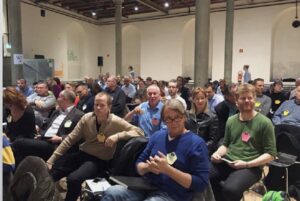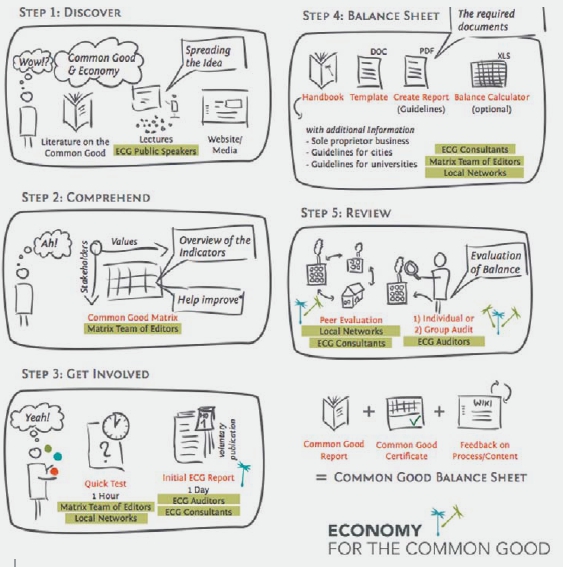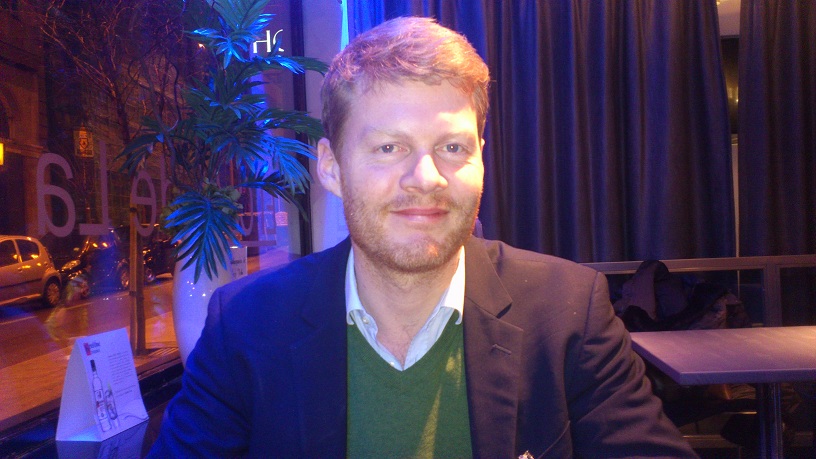 What is the role of a company in the universe? When an organization is founded, the question is Why? Is the answer: to produce clothing so people can stay warm – or whatever they create? Or to maximize profits for the founders and the investors?
What is the role of a company in the universe? When an organization is founded, the question is Why? Is the answer: to produce clothing so people can stay warm – or whatever they create? Or to maximize profits for the founders and the investors?
Christian Felber shows the audience in Vienna at the “Evolution of Organization” conference (organized by Lift – Leadership for Transition) a slide with circles. The ecosphere is the largest circle, then we have societies or mankind, followed by the smaller circle of the economy – made up of organizations. The circles visualize how to re-embed economy and give it its proper place: the economy is supposed to be part of society. It is supposed to serve the greater context: to provide human beings with what they need. Organizations should serve the greater good.
 Theoretically, that is. Because today, we seem to have passed that point. Corporations exist to maximize shareholder value. To grow and grow – to maximize return on investment.
Theoretically, that is. Because today, we seem to have passed that point. Corporations exist to maximize shareholder value. To grow and grow – to maximize return on investment.
The ultimate goal of the economy is to serve the common good, declares Christian Felber. Even an economy with a small GDP can satisfy human needs. The economy is just a tool – but it has become an end in itself. Oiknomia, the ancient Greek word, meant a good life and just society, in the times of Aristotle. Competition is derived from the ancient Latin word “com-petere” which means searching together…. Searching to satisfy the needs of villagers, starting to work together and build up a village economy for the common good. So everyone would have clothes, shelter, food and so on…
The Common Good
 Christian Felber is not just an activist, but a scholar and an entrepreneur. He’s a lecturer at the Vienna University of Economics and Business and author of several bestsellers including: “50 Suggestions for a Fairer World”, “New Values for the Economy”, “Let’s save the Euro!”, “Change Everything: Creating an economy for the common good” and “Money. The new rules of the game”. He initiated the movement of the “Economy for the Common Good” and the project “Bank for the Common Good” (ECG).
Christian Felber is not just an activist, but a scholar and an entrepreneur. He’s a lecturer at the Vienna University of Economics and Business and author of several bestsellers including: “50 Suggestions for a Fairer World”, “New Values for the Economy”, “Let’s save the Euro!”, “Change Everything: Creating an economy for the common good” and “Money. The new rules of the game”. He initiated the movement of the “Economy for the Common Good” and the project “Bank for the Common Good” (ECG).
He did his homework. What is the common good? Looking into constitutions everywhere – he studied what people thought was fair and just. There are commonalities of what a good, purposeful life and a just society entail. Felber co-founded Attac Austria, a group of 12 Austrian entrepreneurs who started to apply these constitutional principles in business, trying to create a new model that transcended the old polarity of communism and capitalism. The Economy for the Common Good (ECG) movement was born. Today about 1750 companies, primarily from Germany, Austria and Switzerland, have declared their support to ECG and are serving the common good while trying to improve their scores.
Balanced Scorecard
 Scores? Yes. Felber and his fellows developed a sort of balanced scorecard that reflects “Common Good” parameters. It’s a way to measure the “common good” ratio of an economy, and of individual organizations that are audited. It awards participating companies points based on the extent to which they have acted in a humane, cooperative, sustainable, just and democratic manner. There are minus points for violating labor standards, pollution, unequal pay for women and using tax havens. The common good matrix measures five values derived from national constitutions: human dignity, cooperation & solidarity, ecological sustainability, social justice, and democratic co-determination & transparency. It defines what these values mean for different stakeholders: suppliers, investors, employees, customers and the social environment. It attributes points to positive criteria that are present in an organization, for instance: low-income disparity within a company. Or: ethical relationships with customers. Or: elimination of unpaid overtime work. Negative criteria can be many as well, ranging from pollution to dumping prices, hoarding knowledge through patents, planned obsolescence (short lifespan of a product, on purpose, so you have to buy a new one!) etc.
Scores? Yes. Felber and his fellows developed a sort of balanced scorecard that reflects “Common Good” parameters. It’s a way to measure the “common good” ratio of an economy, and of individual organizations that are audited. It awards participating companies points based on the extent to which they have acted in a humane, cooperative, sustainable, just and democratic manner. There are minus points for violating labor standards, pollution, unequal pay for women and using tax havens. The common good matrix measures five values derived from national constitutions: human dignity, cooperation & solidarity, ecological sustainability, social justice, and democratic co-determination & transparency. It defines what these values mean for different stakeholders: suppliers, investors, employees, customers and the social environment. It attributes points to positive criteria that are present in an organization, for instance: low-income disparity within a company. Or: ethical relationships with customers. Or: elimination of unpaid overtime work. Negative criteria can be many as well, ranging from pollution to dumping prices, hoarding knowledge through patents, planned obsolescence (short lifespan of a product, on purpose, so you have to buy a new one!) etc.
Meaningful products and services?
The matrix offers “common” questions to check whether products and services are meaningful (do we need it?), whether they are sold ethically, whether they are produced in a sustainable way, and so on. An external auditor assesses the company’s dealings with suppliers, investors, staff, customers and the community according to a prescribed matrix of criteria, then awards an overall score – the maximum is 1,000 points.
The results is an ECG-label that determines the organization’s ECG rating. How much and how well are they contributing to the common good? That’s a painful question to answer for many modern corporations, in my opinion…
How different the world would look if all organizations would adhere to these principles! They align with positive leadership, cultures of kindness and inclusive change, as this magazine advocates.
Systemic, economic change
 It is the goal of the ECG movement to make the ECG-balance score card obligatory – to bring about systemic, economic change. In the transition period, there must be compensations for organizations who start to serve the common good in this transparent way. ECG-companies can have a severe disadvantage when compared to their money-driven competitors who may use cheap labor, exclude others, market their products unethically or produce them in a non-sustainable way. Social justice, solidarity, and sustainability have a price. For that reason, the ECG argues for tax cuts, grants and legal incentives and advantages for ECG-friendly organizations.
It is the goal of the ECG movement to make the ECG-balance score card obligatory – to bring about systemic, economic change. In the transition period, there must be compensations for organizations who start to serve the common good in this transparent way. ECG-companies can have a severe disadvantage when compared to their money-driven competitors who may use cheap labor, exclude others, market their products unethically or produce them in a non-sustainable way. Social justice, solidarity, and sustainability have a price. For that reason, the ECG argues for tax cuts, grants and legal incentives and advantages for ECG-friendly organizations.
They have also founded a bank to help fund the ECG companies: see https://www.mitgruenden.at for the Austrian branch. Individuals can buy shares in ECG-companies.

Humane Businesses
Christian Felber is a passionate advocate of a fairer world – encouraging organizations to respect the triple P’s: people, planet, and profit. At its core, ECG wants to apply the standards of human relationships to the world of business, he concludes. “In the economy, we learn to behave in an ethically different way than in our private lives. In business life, you’re more successful if you behave egoistically. In my view, that is a system error. Because in your private life you will never make a friend if you behave greedily.”
The ECG is growing seriously – not just with brave, pioneer organizations who submit themselves to the ECG-audit but also with ambassadors, entrepreneurs, lobbyists and bankers who strive for a better world. I’m excited to see where this is going…!
- How are you contributing to the common good?
- How do you act in a humane, cooperative, sustainable, just and democratic manner?
- How can you entice (your) organizations to act in a humane, cooperative, sustainable, just and democratic manner?
TEN GUIDING PRINCIPLES for the Common Good
- The Economy for the Common Good (ECG) strives towards an ethical market economy designed to increase the quality of life for all and not to increase the wealth of a few.
- The ECG helps promote the values of human dignity, human rights, and ecological responsibility into day-to-day business practice.
- The Common Good Matrix indicates to what extent these values are put into practice in a company. The Matrix is being continually improved upon in an open, democratic process.
- The Matrix provides the basis for companies to create a Common Good Balance Sheet. The Common Good Report then describes how a company has implemented these universal values and looks at areas in need of improvement. The report and the balance sheet are externally audited and then published. As a result, a company’s contribution to the Common Good is made available to the public and all stakeholders.

- Common Good companies benefit in the marketplace through consumer choice, cooperation partners, and common-good-oriented lending institutions.
- To offset higher costs resulting from ethical, social and ecological activities, Common Good companies should benefit from advantages in taxation, bank loans and public grants and contracts.
- Business profits serve to strengthen and stabilize a company and to ensure the income of owners and employees over the long term. Profits should not, however, serve the interests of external investors. This allows entrepreneurs more flexibility to work for the Common Good and frees them from the pressure of maximizing the return on investment.
- Another result is that companies are no longer forced to expand and grow. This opens up a myriad of new opportunities to design business to improve the quality of life and help safeguard the natural world. Mutual appreciation, fairness, creativity and cooperation can better thrive in such a working environment.
- Reducing income inequality is mandatory in order to assure everyone equal economic and political opportunities.
- The Economy for the Common Good movement invites you to take part in recreating an economy based on these values. All our ideas about creating an ethical and sustainable economic order are developed in an open, democratic process, will be voted upon by the people and will be enshrined in our constitutions.
More information: https://www.ecogood.org/en/
The details of the ECG balance card: https://balance.ecogood.org/matrix-4-1-en/ecg-matrix-en.pdf
Watch Christian Felber explain ECG: https://www.youtube.com/watch?v=D3Z2cXK5mhc&list=PLG3rwKoWtyQy7H20G-IS7xZLFqJzrxDqm

One Response
Thank you for addressing this interesting and promising subject.